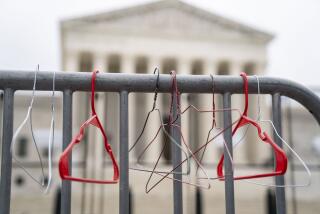Op-Ed: Trump’s list of judges isn’t a nightmare all-star team of Neil Gorsuches. Here’s what Dems can hope for
President Trump isn’t expected to unveil his pick for the Supreme Court until Monday, but already the leading contenders are drawing fire — from within the conservative fold.
Front-runner Brett Kavanaugh, a judge on the D.C. Circuit Court of Appeals, has been the subject of a weird whisper campaign. Somehow the credentialed, blemish-free conservative is too much of an “establishment” candidate. His critics cite his vote against letting a pregnant teenage immigrant held in detention in Texas have an abortion, because he failed to additionally opine that she had no constitutional right to an abortion. Meanwhile, Breitbart News wrote that 6th Circuit Judge Raymond Kethledge was too inclined to decide cases based on moral judgments rather than constitutional originalism.
To those of us who don’t live inside the conservative movement, these criticisms seem, in a word, nuts. But for the purposes of understanding the coming nomination battle, this infighting illuminates how there are important, if nuanced, differences among the jurists on Trump’s famous list of 25 Federalist-Society-blessed candidates.
Many Democrats assume that they are facing a nightmare all-star team of Neil Gorsuches, all one shade of deep black, and any one of whom is ready and eager to overrule Roe vs. Wade and fulfill other longstanding dreams of the extreme right. But the internal sniping suggests that what looks from the outside like a monolithic army, in fact, divides up roughly into different camps.
Among institutionalists we should prefer someone who is primarily a judicial conservative over a social conservative.
So what sort of extreme conservative might be preferable to have on the Supreme Court, if that must be our choice? I think that there are three distinctions that are important.
The first is that it’s important for the nominee to be an institutionalist, that is, someone who recognizes the importance of the court and the coordinate branches of government. Most everyone on the list qualifies. Indeed, that was the point of promulgating the list during the campaign — to signal to conservatives that Trump would not be as deranged as he otherwise appeared when it came to judicial nominations. (Some have speculated that the list may have helped reassure Justice Anthony Kennedy that he could safely retire.) If Trump were to go off-list and choose, say, Fox News host Jeanine Pirro — the kind of judicial candidate that is analogous to Trump as a politician — it would be a disaster for the court, which functions on mutual respect, collegiality and a vision of long-range stability.
Among institutionalists, in turn, we should prefer someone who is primarily a judicial conservative over a social conservative. Everyone on the list is both, to some degree. Still, there are some whose allegiance to the Federalist Society agenda is largely about social issues such as abortion. This seems to be the far-right’s beef with Kavanaugh; his judicial views may be unimpeachable, but he has demonstrated insufficient personal antipathy to abortion, gays and other perceived social evils.
Enter the Fray: First takes on the news of the minute from L.A. Times Opinion »
If we’ve winnowed the list to judicial conservatives, the country and court are better served by a judicial restraint conservative — one who’d emphasize the need for caution in overturning precedent — rather than what we might call a lost Constitution conservative. This latter group believes that the court went deeply wrong sometime in the 1960s or before, issuing scores of rulings that in their eyes are liberal and activist. This identifiable cadre seeks to turn back the clock. Many of them admire the jurisprudence of Justice Clarence Thomas, who has called for the demolition of a series of bedrock constitutional doctrines from the last 70 years.
Seventh Circuit Judge Amy Coney Barrett, the third of the reported front-runners, may have signaled her allegiance to this camp when she opined that some conservatives place too much emphasis on judicial restraint, writing “deference to a democratic majority should not supersede a judge’s duty to apply clear text.” These words suggest judicial restraint is a secondary value for her, and that she’d be less reluctant than others to jettison core precedents.
All of these distinctions are shades within shades, of course. Barring some deus ex machina ending in which the nominee goes down in flames — a turn that would be richly deserved after the Republicans’ asphyxiation of the Merrick Garland nomination — the country will be stuck with an extremely conservative majority on the court for a generation or more. But what kind of conservatives will constitute that majority will matter at the margins, and maybe more than the margins, so it is important to be clear about the nuanced differences before us as the president readies his choice.
Harry Litman teaches constitutional law at UC San Diego. He is a former U.S. attorney and deputy assistant attorney general.
Follow the Opinion section on Twitter @latimesopinion and Facebook.
More to Read
A cure for the common opinion
Get thought-provoking perspectives with our weekly newsletter.
You may occasionally receive promotional content from the Los Angeles Times.






